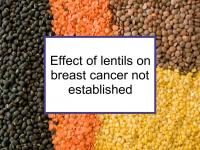Lentils (Lens culinaris) are a good source of fiber, folate, thiamin (vitamin B1), as well as some iron, and have a relatively high antioxidant content compared to other legumes. Consumption of related legumes such as black beans and navy beans has been shown to be chemopreventive against breast cancer.
Several population-based studies have found that consumption of beans and lentils is associated with decreased risks of prostate cancer and pancreatic cancer. A case-control study of African Americans found that consumption of legumes such as dried beans, split peas, and lentils was negatively related to risk of colorectal cancer. Another study found that colon cancer recurrence was less likely for those with high dry bean intakes (the same study found no such benefit for increased fruit or vegetable intake).
Breast cancer-related effects of eating lentils
Lentil consumption normally is combined with dry bean consumption in population studies, partially because people who regularly consume lentils typically also consume other dried legumes. Therefore, while available studies appear to support lentil consumption for breast cancer patients, survivors and those at high risk for breast cancer, they are not definitive. One study of the diets of 90,630 women in the Nurses Health Study II found a significant inverse relationship between breast cancer and intake of beans and lentils.
Another study reported that peptides produced from red and brown lentils had anti‐proliferative activities in liver, prostate, and breast cancer cells.
Note that lentils incorporate some copper (approximately 0.05 mg per ounce raw lentils), which has been shown to increase angiogenesis and metastasis of breast cancer, especially in women with aggressive disease such as inflammatory breast cancer (IBC), triple negative (ER-/PR-/HER2-) or HER2 overexpressing (HER2+) breast cancer. While copper is a vital nutrient, women with breast cancer who are not anemic probably should not exceed the RDA (recommended daily allowance) of approximately 0.9 mg.
Additional comments
Various types of lentils are used to make dal (dahl, dhal), a preparation of split dehusked dried beans frequently used in South Asian cuisine.
Sources of information provided in this webpage
The information above, which is updated continually as new research becomes available, has been developed based solely on the results of academic studies. Clicking on any of the underlined terms will take you to its tag or webpage, which contain more extensive information.
Below are links to 20 recent studies concerning this food or its components. For a more complete list of studies, please click on lentils.
